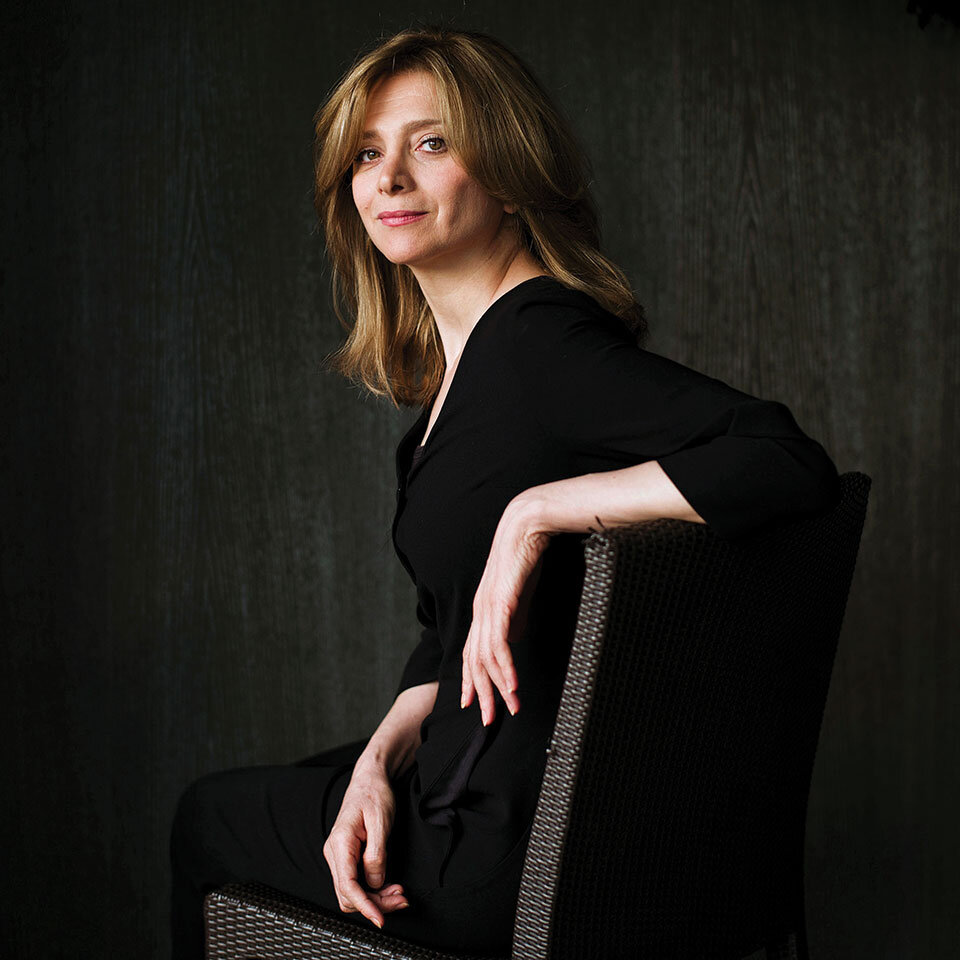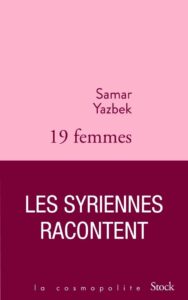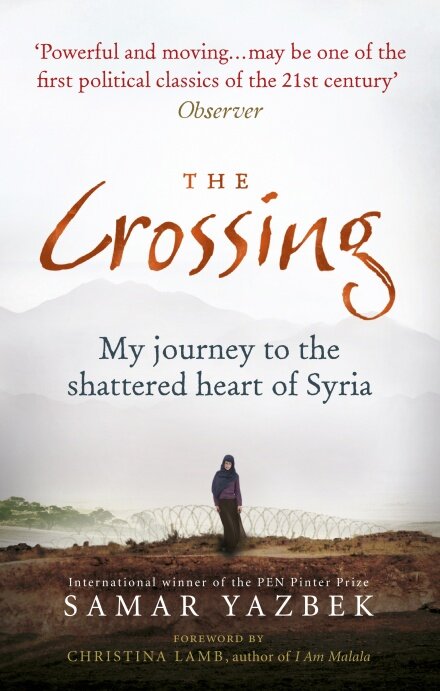
Samar Yazbek is the first woman to be profiled in a new TMR series on trailblazing Arab, Iranian and other women of the Middle East and North Africa. Next, Nada Ghosn will speak with Kuwait’s feminist activist, Dr. AlAnoud Al Sharekh.
Samar Yazbek is a Syrian novelist and journalist. Born in Jableh, Syria, in 1970, she studied Arabic literature at the University of Latakia and is the author of several novels, as well as short stories, screenplays and film reviews. She is also a prominent voice for the defense of human rights and especially women’s rights in Syria, ranked according to The Global Gender Gap Report 2020 as the third worst of ten countries with respect to gender equality. In 2013, she founded Women Now for Development, an NGO based in France whose aim is to empower Syrian women economically and socially, and to support children’s education.
 In 2011, Samar took part in the popular uprising against Bahar al-Assad’s regime and was forced into exile a few months later. She published A Woman in the Crossfire : Diaries of the Syrian Revolution in 2012, receiving the prestigious PEN/Pinter Award in the UK, the Tucholsky Award in Sweden, and the Oxfam/PEN Award in the Netherlands. In 2016, after several clandestine trips to northern Syria, she published The Crossing: My Journey to the Shattered Heart of Syria, describing the transformation of the revolution, which received France’s Best Foreign Book award and was translated into 17 languages. Some consider The Crossing a modern political classic. Yazbek’s novel La marcheuse (Stock 2018) was shortlisted for France’s Fémina prize.
In 2011, Samar took part in the popular uprising against Bahar al-Assad’s regime and was forced into exile a few months later. She published A Woman in the Crossfire : Diaries of the Syrian Revolution in 2012, receiving the prestigious PEN/Pinter Award in the UK, the Tucholsky Award in Sweden, and the Oxfam/PEN Award in the Netherlands. In 2016, after several clandestine trips to northern Syria, she published The Crossing: My Journey to the Shattered Heart of Syria, describing the transformation of the revolution, which received France’s Best Foreign Book award and was translated into 17 languages. Some consider The Crossing a modern political classic. Yazbek’s novel La marcheuse (Stock 2018) was shortlisted for France’s Fémina prize.
Often compared to Svetlana Alexievitch (Nobel Prize for Literature 2015) in the press, Samar Yazbek’s books have greatly contributed to illuminating the human aspect of the Syrian tragedy in all its complexities. Her latest nonfiction book is 19 Women, featuring the collected testimonies of Syrian women who resisted in various ways to the various fronts of repression. Says Yazbek, “19 Women is the result of a series of interviews I conducted with Syrian women in their countries of asylum, as well as within Syrian territory. I asked each of them to tell me about ‘their’ revolution and ‘their’ war. All of them have described the terrible ordeal they went through. I am haunted by the duty to constitute a memory of the events that would counter the narrative that seeks to justify the crimes committed, a memory that, based on indisputable facts, would provide proof of the righteousness of our cause. This book is my way of resisting.”
We met Samar Yazbek in Paris, where she lives, for an interview.
Foreword and interview by Nada Ghosn
I experienced a personal revolution in detaching myself from my family, my social milieu and my community by getting divorced and leaving. What I went through was much more difficult than the revolution itself. My choices were heavy to take on vis-à-vis the extended family, the neighbors, or the neighborhood. I wanted to be an independent woman, without being called a slut. After my marriage, I moved to Cyprus. There I worked as a waitress and a dressmaker and did other odd jobs. Then I returned to Syria and got divorced. You might say I seized my freedom, but my life was difficult…I’m not sure I’ve lived. Women suffer the violence of society more than men. That is why I am working with them today.
“Women are generally silenced, especially in the interior of the country. Exile and displacement have only exacerbated the situation. I won’t forget that I was constantly ordered to keep quiet because I was a young girl. I don’t regret anything I did… but I regret not having done more because of social pressures. In spite of everything, the revolution made me a new person, it gave me a soul, an experience, a strength. It allowed me to get out of the shackles imposed by our society.” – Sara

Before all that, I conducted research on the situation of women in Syria. It is difficult to talk about the situation of Syrian women in general; it depends on the region. Talking about one Syria refers to total military control of the territory by the regime. Already before the war, their situation was disparate within the territory, even if one could draw general lines. At the beginning of the demonstrations, women were present in the cities and in the countryside, although in different ways. In the cities, security men systematically intervened to arrest them, and then the shabbihas (secret militias) appeared.
In the countryside, demonstrations were not mixed. Let’s not forget that religion is very present in rural areas. From the moment there were arrests, women no longer demonstrated, because of the sexual violence and the shame it would bring on families that could lead to honor killings.
After a sexual assault committed during a demonstration, the men of Barzeh forbade the women to participate in the gatherings. This was at the end of 2011. I went to see those who had made this decision to tell them that women make up fifty percent of society. But for them, our participation was religiously illicit. I reminded them that half of those participants in the rallies organized by the regime were women. Then they said to me, ‘Women’s honor is a red line.’ After a long debate, they finally authorized us to demonstrate, but separately from men. —Rim
The revolution thus began as a social revolution. But the war brought out all the violence against women. The only thing that can affect a man’s honor is the rape of his wife. It is a symbolic murder, the woman being his property. The rapes committed by the shabbihas were the first crimes of the regime. This industry of evil was one of the first causes of the revolution’s slide into violence. Daesh (ISIS) and the Islamist militias perpetuated these practices. The rape of Alaouite women by one side and Sunni women by the other became a weapon of war.
In the cities or in the countryside, in the first year, women were symbols, the showcase of the revolution. But they were symbolically murdered by their comrades. They were the targets of the regime, of the revolutionaries, as well as of the militias that oppressed them politically. With the war, the tensions within Syrian identity since the country’s independence exploded. Our identity became fragmented. Intellectuals proved to be communitarian and separatist as well. Revolutionaries have not been less limiting for women. They wanted them to remain confined within the home; they did not ask for social revolution, only political, because they did not want Islamists.
In our city, there were religious movements such as Naqchanbandiya [a powerful Sufi brotherhood in Syria] and Salafism. There are also political parties such as the Socialist Party. None of these movements, religious or not, spared women (…) During the siege of Douma, I continued to work with the Coordinating Committee of Revolutionary Women, but very soon I had a conflict with one of its members because Jaysh al-Islam had ended up controlling everything. The rise of armed men was accompanied by religious radicalization. —Faten
In areas controlled by Daesh, women disappeared. They accompanied the men and took care of the children. They organized themselves to move life forward, however, they were not coordinated with each other. As a result of the dispersal of families, women had to fend for themselves and make decisions alone. They became more independent. I thought I knew their situation, but when I went to the countryside of Aleppo and Idlib in 2012, I discovered these exceptional women of the people. I was very happy to see them. That is why I wrote my book 19 Women. I wanted several voices to be heard. I wanted to constitute a memory of women, at least a small part of it. I believe that everything we do, one day, causes a change. These testimonies are for the future.
When I went to the north of Syria in 2012, I also felt the desire to work with women. Thanks to the prizes I received for my books, I was able to found my NGO Women Now For Development in 2013, to support initiatives that enable women’s economic autonomy and children’s education. The idea of my organization was to build a network of grassroots women. In the regions controlled by the regime, only 2% of the middle class remained. The rest of the population emigrated. We relied on this educated class to train women with little or no education in our organization. This work continues today, even though we had to change our name to work in this region. I communicate with the team there every day. Today we have built a network of 11,000 women and 120 employees between northern Syria and the Bekaa in Lebanon.
I’ve evolved a lot thanks to the work I’ve done. I lived in very hard conditions, without electricity, without water…with the omnipresence of death. But the extraordinary experience of working with women in a context of war and revolution made me mature and allowed me to meet people from all walks of life. —Alia
Generally speaking, I think that intellectuals are concerned about the change in society. One cannot ask for justice without acting to change one’s own life and make things happen around one. Fieldwork is a part of me. Since 1995, I have been involved in organizations for the defense of press freedom, women’s and children’s rights, but I created this organization in 2013 in order to give a voice to a generation, and give it the tools to move forward. I wanted to bring that momentum forward, and I brought together a group of people who wanted to work towards that. The women concerned by our actions propose the programs according to their needs; it is an experience of democracy that has led to very important progress in their living conditions.
I work so that today’s victims do not become tomorrow’s executioners. What we are working on is feminist, even if there are also men working with us. We are only at the stage of laying the groundwork, offering training and psychological support to women. It is not possible to talk about feminist movements in Syria, even during the revolution. We can only speak of “women” because movements imply the presence of a democracy, and it still takes time to get there.
In the 1950s, there were rallies fighting for women’s rights, but they did not succeed in changing the constitution. They were demoted in the 1970s because of the regime’s policies. After the Iranian revolution, Syria completely closed itself off. In the ‘80s, the dictatorial regime repressed the Islamists, and people returned to religion. At the same time, left-wing movements began to disappear in the Arab world, and social networks provided a platform for those who advocated religion. The revolution then allowed the emergence of the religious already present in society. Moderate Islam that wanted reform was not encouraged because it would have brought an end to the regime. Instead, the government strengthened the qubaysiyat [a movement of rigid Sunni women that appeared in the mid-1960s in semi-clandestinity that takes its name from its founder Munira Qubaysi (n. 1932), a preacher from Damascus. While claiming to be of Sufi naqchanbandi Islam, it is characterized by its rigorism and its culture of secrecy]. With the Syrian government, this group of women was able to establish good relations by recruiting followers from the upper classes. They invested in the school sector by creating a large network of schools.
When I created my organization, I tried to attract rich women. Generally speaking, patriarchal society is a model of political and social thinking. It follows power, generally speaking “the strongest.” The first to insult women are women; the most abused women are abused by women. Raised in the patriarchy, women draw strength from it by siding with the most powerful. And this is passed on from generation to generation: within the family, women enjoy an inferior status, they cannot express their wishes, and the family evolves within a society that preserves traditions.
I chose these women thanks to the network set up in Syria. I wanted to make them testify because I admire them. After the revolution, it seemed important to me to narrate the Syrian reality. During these nine years since the beginning of the uprising, I have gained a lot of experience, I have changed. Before that, I had written articles, novels, short stories and screenplays about “the world from below,” women’s rights, Ghada Samman’s spirit of liberation, the military, and the clandestine circles in Syria. There was always something political in what I wrote. But today, it is the relationship to evil that interests me most; this is the subject of my next book, which I am currently working on.
–Samar Yazbek


